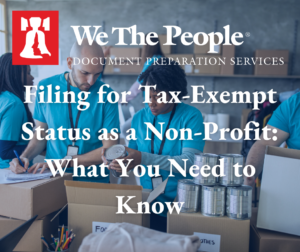 Filing for Tax-Exempt Status as a Non-Profit: What You Need to Know
Filing for Tax-Exempt Status as a Non-Profit: What You Need to Know
As a non-profit organization, you may be eligible for tax-exempt status. This status allows your organization to be exempt from paying federal and state income taxes, as well as certain other taxes. Additionally, donors to your organization may be able to deduct their contributions from their taxes. Here’s what you need to know about filing for tax-exempt status as a non-profit.
Types of Tax-Exempt Status
There are two types of tax-exempt status that non-profit organizations can apply for:
1. 501(c)(3) status: This is the most common type of tax-exempt status and is reserved for organizations that are organized and operated exclusively for charitable, religious, educational, scientific, or literary purposes.
2. 501(c)(4) status: This status is for organizations that are primarily focused on promoting social welfare or community improvement. These organizations are not required to operate exclusively for charitable purposes.
The Application Process
To apply for tax-exempt status, you will need to file Form 1023 or Form 1023-EZ with the Internal Revenue Service (IRS). The application process can be complex and time-consuming, but it is essential to ensuring that your organization is in compliance with all relevant tax laws.
Form 1023 is the standard application form for tax-exempt status and is appropriate for most organizations. Form 1023-EZ is a streamlined version of the application that is available for smaller organizations with gross receipts of less than $50,000 per year.
Both forms require detailed information about your organization, including its purpose, activities, governance structure, and financial information. You will also need to provide copies of your organization’s Articles of Incorporation, Bylaws, and any other relevant documents.
Once your application is submitted, it can take several months for the IRS to review and approve it. If your application is approved, you will receive a determination letter confirming your tax-exempt status.
Maintaining Tax-Exempt Status
Once you have obtained tax-exempt status, it is important to maintain it by complying with all relevant laws and regulations. This includes filing annual reports with the IRS and keeping detailed records of your organization’s activities and finances.
If your organization’s activities or structure change, it is important to notify the IRS to ensure that your tax-exempt status is not jeopardized.
Filing for tax-exempt status as a non-profit is essential to ensuring that your organization is able to operate effectively and make a positive impact in your community. By following the appropriate procedures, you can navigate the application process and maintain your tax-exempt status for years to come.
At We The People, we can help get your non-profit started. Contact us to learn more.
Disclaimer: This content is for informational purposes only and should not be considered legal advice. Consult with a licensed and qualified attorney for advice specific to your situation.
This text is property of We The People® and may not be copied, printed, or distributed in any fashion.

